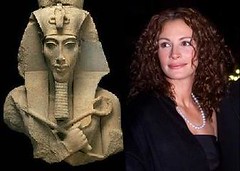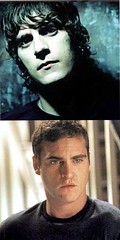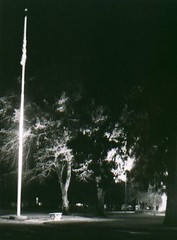I boarded the plane without incident, my messenger bag fastened securely around me, the bulk of the weight resting square on my back. It was evident from the surplus of vacant seats in the terminal that the flight would be nowhere near full. I made my way to my seat near the back of the aircraft. The other passengers continued boarding as I settled in for the long flight; I pulled a worn paperback from the bag, then placed it securely in the overhead bin and took my seat.
I continued to watch as the individuals settled in for the long flight. There were no more than twenty passengers on the Boeing 737 aircraft. There was a soldier in the row ahead of me; a middle-aged priest sat three rows directly ahead of me. A young woman, no older than myself, was further up, and seated across the aisle from her was a tall man of about thirty, with a shaven head and a pierced ear. Two men who looked like brothers, most likely university students, were seated across an aisle from each other; and in a window seat, standing until the last possible moment, was a stocky man with a beard, wearing a baseball cap and a work jacket.
The two flight attendants, both of them women in their late twenties, finally closed the door and proceeded with the safety demonstration; I paid attention, which is to say that I watched without really comprehending what they had to say. The young woman, the priest, and the soldier appeared to pay close attention as well, while most of the others seemed to ignore the demonstration altogether. We taxied to the runaway, and the flight crew adeptly took us aloft. It was an inauspicious beginning to a bittersweet journey.
I immersed myself for several hours in my book, an increasingly obscure piece of Renaissance poetry; it had been assigned to me as required reading in two different courses I’d taken at university, and I’d almost instantly taken a liking to it. Having forgotten bits and pieces of the story during the interim, I’d decided to reread the first portion before continuing with the other volumes by the same author. Eventually I broke the tedium by getting up and using the lavatory at the back of the plane.
As I returned to my seat, the young woman got up and sat across the aisle from me. I smiled, and she smiled back.
"Good evening," I said politely.
"Hi. My name’s Christine," she said with a slight trace of Texan drawl. She extended her hand; I took it.
"My name is Luke Simonson," I answered. "Is this your first trip to Comarbis?"
"It is," she answered. "I just graduated from the University of Texas, and I’m meeting a couple of my friends there. What about you?"
I paused momentarily, considering how to phrase my answer. "I’m a writer, and I’m doing a story about the city. It’s my first visit there as well."
"A writer?" asked Christine. "What was your degree in?"
"History," I answered. "I’m from the West coast, but I went to school at the University of Wyoming."
"I was in Wyoming once. My parents took me to Yellowstone National Park when I was a kid. All I really remember are all the buffaloes." She saw me wince. "What’s wrong?"
"They’re actually called 'bison'," I answered. "Sorry, I’m sort of a stickler on things like that. It drives my friends crazy."
Christine smiled. "That’s okay, I don’t mind at all. I hate it when people mispronounce or butcher things about Texas. That’s something I’m a stickler for: if you’re going to say a word from another region or culture or language, you should at least make an effort to pronounce it the way they’d pronounce it. Even if you mess it up, you’ve still made the effort."
I smiled back at her. "It’s good to find someone who feels that way. My father always mispronounces things, even people’s names, and then acts as if it’s nothing to be at all concerned with. Well, at any rate, enough about that," I said. "You said you just graduated. What did you get your degree in?"
"My degree’s in accounting. It’s pretty generic, I guess; the way I figure, as long as I have the credentials, I should always be able to find a job, even if it’s just to help me stay on my feet. I actually have a job lined up for when I get back, doing accounting for a theater in Dallas."
"That's wonderful," I said. "Do you have a dramatic background?"
"Wrong kind of theater. This one does mostly concerts. Mostly rock and roll, but some jazz and blues, and even classical. I just hope I can still stand to go to a show once in a while after sitting in an office in the building all week." Her eyes diverted quickly to the seat next to me, then back up to my face. "I read that in college."
I looked down, and realized that she was referring to my paperback. "I'm rereading the first part so that I can remember the details when I go on to read the other two in the near future. I think it's just astonishing that we spend so much a year on printing, purchasing, and reading absolute rubbish when there are classics like this that are completely unappreciated."
Christine bit her lip. "Well, I see your point. I've read some great old books, but there are some great new books that I really enjoy reading."
I nodded. "Well of course. My point is just... Okay, I'm not an environmentalist or anything, but I believe in using resources responsibly. Some senator publishing a book about his agenda during an election year is a waste. Some psuedo-historian publishing another book about how Cleopatra is relevant to today's woman is a waste. But of course, there are still things worth printing... Books by C.S. Lewis, or Ian Fleming, or Michael Crichton, for example."
"Oh, okay," said Christine, smiling. "And I agree, people don't appreciate the classics like they ought to."
I grimaced a bit. "Sorry, I don't usually go off on a rant like that. I feel as if I'm being quite rude."
"No, not at all," she said. "The guy across the aisle from me was listening to some loud music, and those two brothers, or at least I think they're brothers, are jabbering on and on about some video game. I got bored with my magazine, so it was either you, or the priest, or the soldier. You looked about my age, so I figured I'd introduce myself."
"Well, I'm glad you did. We may as well continue, I suppose; it's going to be a long flight."
"What made you decide to write about Comarbis?" she asked.
"Well, there seem to be a lot of people fascinated with it, but most people don't have any context. They think it's this wonderful place, with a lot of opportunities, and my guess is that that's true; but the stereotypes about the gorgeous architecture, the instantaneous transformation of your disposition, the connectedness between Comarbis and the outside world... I guess I want to set the record straight, and I found an agent that was willing to facilitate the whole thing."
Christine hesitated. "Well, what do you think that it's like?"
I nodded. "That's a fair question. Well, I guess the first thing would be the connectedness. I'm under the impression, after studying the more reliable of the available sources, that the city is far more isolated than we'd like to think. Sure, we have indications, outright proof depending on how you look at it, that the Comarbis government is extremely powerful; but there doesn't seem to be any verifiable indication that the actual citizens have any interaction with or knowledge of the outside world. And when you think about it, why would they want to?"
"Well, why wouldn't they want to have contact with the outside world?" asked Christine.
"Well, think about it. If you lived in a city that was governed in such a way that you didn't want for anything, and the merest mention of the outside world conjured images of war, and pestilence, and poverty, and fear, wouldn't you want to ignore the outside world?" I asked.
"Well, I suppose I see your point. I don't agree with it, but I can understand it."
"Well, doesn't that just get back to what we both said earlier? It's not so much a matter of agreeing with someone from a foreign culture, but many of the world's problems seem to be caused by people who don't bother considering things from an opposite perspective. I don't like the idea of not having contact with the outside world either, but when I think about it, from their perspective, it makes sense."
Christine nodded. "Okay, what else?"
"Well, I won't find out about most of the other things until we arrive," I said, grinning.
Rachel yawned. We had already been on the plane for five hours, and we were less than halfway to our destination. I suggested that we might follow the example that the priest and the soldier were setting, and have a bit of a nap, then cotinue our discussion later. Christine agreed, and we each stretched out across the seats on our respective sides of the aisle. It wasn't long until the little airline pillow was busy leaving its pattern on my face, flattened against it.





